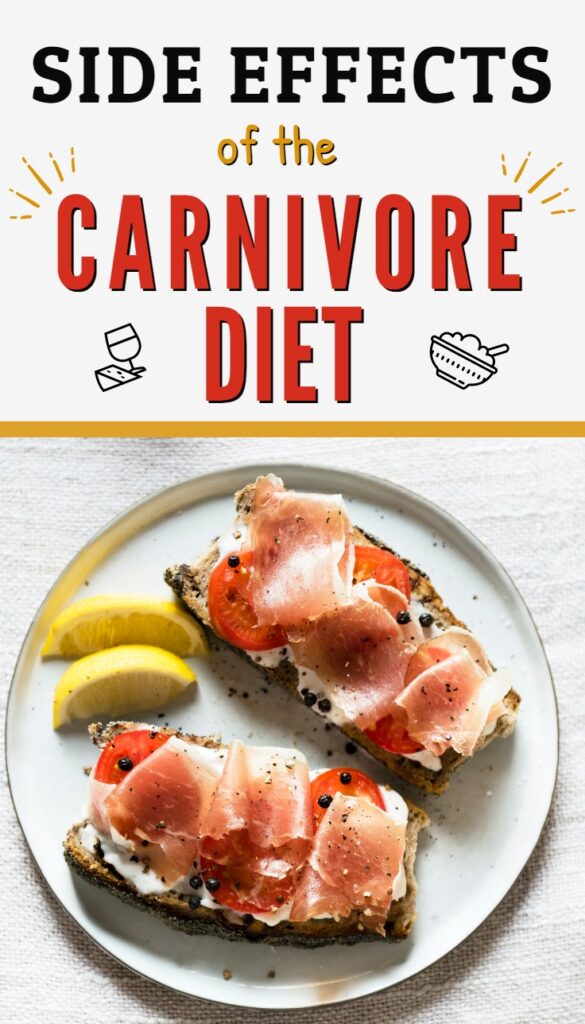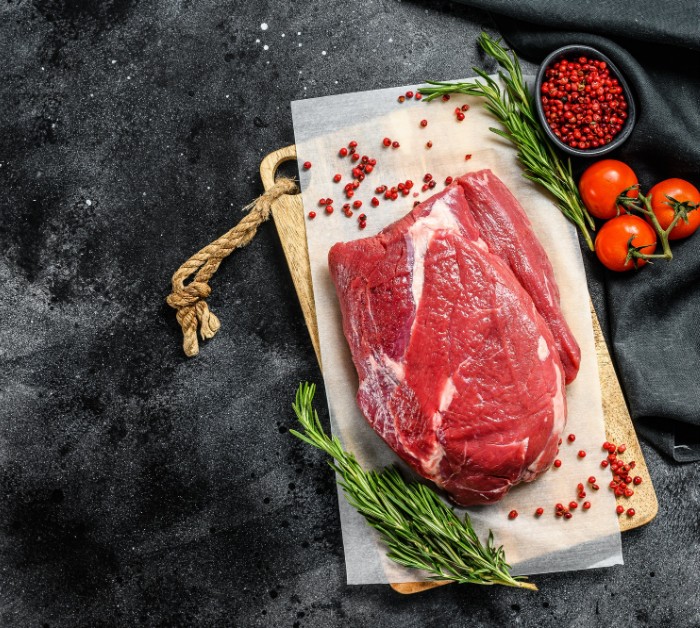Carnivore Diet – What happens after days of eating only meat and nothing else?
You want to know what will happen with your body if you only eat meat and animal products, no other foods like fruits or vegetables. Yes, this is the Carnivore Diet and it is so extreme and it is not for everybody. The Carnivore Diet side effects are mostly shown at the beginning when you start with this kind of food.
Also called an “all-meat diet”, this kind of eating is not suitable for everyone. Just imagine if only eating meat and animal products and nothing else.
What Is The Carnivore Diet?
The Carnivore Diet is an extremely restrictive diet that consists entirely of meat and animal products (eggs and small amounts of low-lactose dairy products) and excludes all other foods like fruits, vegetables, legumes, grains, nuts, and seeds.
The carnivores believe that human ancestors ate only meat and fish and today’s high-carb diets are the reason for many chronic diseases. Dr. Shawn Baker, an orthopedic doctor is the most well-known proponent of the Carnivore Diet.
Foods To Eat
- Meat: chicken, turkey, beef, lamb, pork, etc.
- Fish: salmon, sardines, crab, lobster, etc.
- Animal products: eggs, bone broth, lard, etc.
- Low-lactose dairy products: hard cheese, butter, heavy cream.
Foods to avoid
All kinds of vegetables, fruits, high-lactose dairy products ( milk, yogurt, soft cheese), legumes, nuts and seeds, grains, alcohol, sugars (table sugar, maple syrup, brown sugar), beverages other than water.

Carnivore Diet Side Effects and Risks
Lack of nutrients that are crucial for the health
If you start practicing the Carnivore Diet there is a big chance that you will stay shorter on some nutrients and the overconsumption of others. The deficiency in the nutrients comes as a result of eliminating highly nutritious foods like fruits, legumes, vegetables, and whole grains.
On a meat-only diet it is so difficult to obtain a regular intake of four major nutrients:
Vitamin C: Important antioxidant that boosts the immune system and stimulates collagen synthesis
Vitamin E: Prevents the oxidation of lipids and lipoproteins
Vitamin K2: Vitamin (fat-soluble) that reduces the calcification of blood vessels
Calcium: Important mineral for nerve transmission, muscle contractions, and healthy bones
There is another problem if you don’t like organ meat. In that case, the number of nutrient deficiencies increases and you can add on the above list plus:
Folate: Also known as vitamin B9, important for cells to divide, metabolism, and DNA methylation.
Vitamin A: Fat-soluble vitamin important for normal vision, immune system, and reproduction.
Magnesium: Needed for regulating muscle and nerve function, blood sugar levels, and blood pressure.
Manganese: Important for the proper function of the nervous system, protection against oxidative stress, and collagen formation.
Diets that are rich in plant-based foods are high in vitamins, fiber, and mineral content but also rich in beneficial plant compounds (phytonutrients) and antioxidants.
Phytonutrients are defined as chemicals produced by plants that protect them from environmental threats, attacks from insects, and diseases. Phytonutrients aren’t essential for keeping you alive like vitamins and minerals, but they can help prevent disease and keep your body working properly.
More than 25000 are found in plant food, the most important are:
- Carotenoids
- Ellagic acid
- Flavonoids
- Resveratrol
- Glucosinolates
- Phytoestrogens
The Carnivore Diet does not contain these compounds and has not been associated with any long-term health benefits.
Does not deliver fiber
Another side effect of the Carnivore Diet is that doesn’t provide fiber. Fiber is a plant-based nutrient a type of carbohydrate, but unlike other carbs, it cannot be broken into digestible sugar molecules. Therefore, fiber passes through the digestive tract relatively intact, but it is important for gut health and healthy bowel movements.
Because the Carnivore Diet does not contain fiber, can cause constipation in some people. Additionally, fiber is important for the proper balance of the bacteria in your gut, lack of this type of carbohydrate can be linked to weakened immunity.
If we summarise one of the main Carnivore Diet side effects is that may harm your gut health.
Keto Flu
During the first one or two weeks on a Carnivore Diet, most people feel exhausted, may have nausea and fatigue, headache, are really annoyed, and having a hard time concentrate. The symptoms are like real flu but this time it is called keto flu.
It is not flu, and it is not dangerous or contagious it is just one of many Carnivore Diet side effects. The keto flu occurs as your body transitions from burning sugar to burning fat for energy needs.
This usually starts in the first week being on a diet and can last a couple of days or even longer and it can be as a result of few things:
- Your body switches from carbs to fat for energy
- Low intake (almost none) of sugar and carbs
- Electrolyte depletion
- Dehydration
Symptoms of the keto flu usually disappear by themselves within a few days or weeks. But if you want to stop suffering faster there are some things that you can do.
Increase your salt and water intake. Loss of salt and water is responsible for most keto flu issues, so increasing them can reduce the symptoms or eliminate them. In the first few days whenever you develop a headache, nausea, or dizziness, drink a glass of water with half a teaspoon of salt stirred into it.
Slower transition. Slow down the transition to the Carnivore Diet by consuming a few more carbs and follow a moderately low-carb diet that provides 20 to 50 grams of carbs per day. Once you’ve adapted to low-carb eating, feel free to eat less than 20 grams of carbs a day and you can see if your body prefers this or a slightly higher carb intake.
Bad Breath
When you switch from a high carb diet where you use glucose as energy fuel to a low carb diet and using ketones as a source of fuel, bad breath is another side effect of the Carnivore Diet.
Your body is changing and your liver produces more ketones when you start with the diet. This means you have a large number of ketone bodies produced like:
- Acetoacetate
- Acetone
- Beta-Hydroxybutyrate
Acetone is created from the breakdown of acetoacetate. During ketosis, acetone defuses into the lungs and exits the body with exhaling. If you have a metallic taste or bad breath it is from the overproduction of acetone.
What to do to overcome this?
- Drink more fluids- Ketones can leave the body via urination, so drinking more fluids can help to get rid of excess ketones.
- Clean mouth- Keep your mouth, teeth, and tongue clean so the air that you exhale doesn’t mix with other bad smells.
- Time- If you don’t bother with this, just wait for some time it will go away on its own.
Diarrhea
Because you are eating food with zero fiber, food passes through your digestive tract too quickly and diarrhea occurs. There are some changes that are happening in your digestive system.
Your bacteria that were used to fiber now die off and are replaced with new meat-eating bacteria. This transition of the bacteria can be one of the reasons for diarrhea.
Another change in your digestive system is that your colon is used to storing and propelling food waste with fiber in it.
Fiber usually soaks the fluid, but now there is no fiber and the colon is filled with liquid and it is not prepared. The result is loose stools!
What to do if you have diarrhea on the Carnivore Diet?
- Reduce consumption of rendered fats – Liquid fats like cream, that can pass through your system quickly.
- Wait for a while – Allow your body to adapt. Keep in mind that you are changing to a zero fiber diet and it takes time for the body to adapt to a new way of eating.
Muscle Cramps
We can include another thing in the carnivore diet side effects and that is leg cramps. The cause for this is a mineral imbalance, especially magnesium. It is not so uncommon to get muscle cramps for low sodium or potassium intake.
To get over this you should increase sodium levels. The easiest way is to add more salt to your diet to prevent the loss of minerals. When sodium levels increase, potassium and magnesium levels usually follow. Try using supplements, especially magnesium when rising sodium levels doesn’t help.
Pounding Heart
Heart palpitations and flutters are other common side effects of the carnivore diet. They are often temporary.
It is common to notice increased heart rate when you start with the all-meat diet due to a lower blood volume as a result of dehydration or lack of electrolytes. The heart in this situation must work harder to maintain your blood pressure, which is the reason why you feel those pounding heartbeats.
The simplest thing that you can do to overcome this is to drink more water and ensuring that you maintain enough salt your body needs. Another thing that you can do is to increase magnesium intake up to 400 mg a day, if the heart palpitations don’t go away for a few weeks try adding some carbs to your diet to increase blood volume.

Final thoughts about the side effects of eating only meat – Carnivore Diet
The Carnivore Diet is extremely restrictive. Foods that are allowed to eat are just meat and animal products. It is also high in fat and sodium, doesn’t contain plant and fiber, which is not good for overall health if you practice this for a long period.
Carnivore diet side effects mentioned above should show you what to expect if you decide to go on this kind of eating. It is not for all and the best thing that you can do before starting is to consult with your doctor. Your body may not be prepared for this kind of food.




